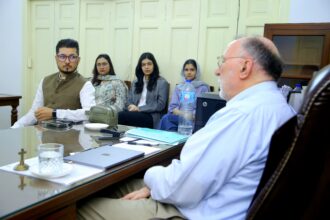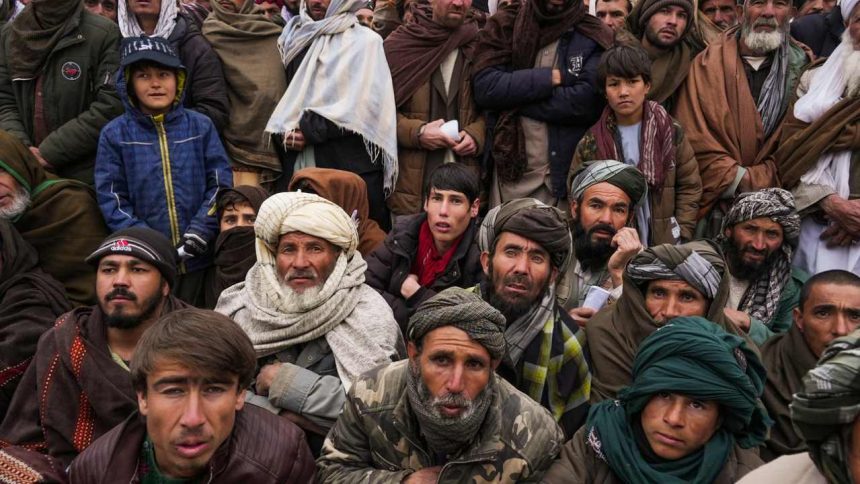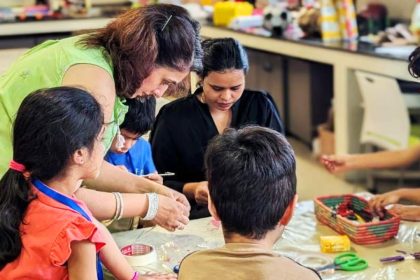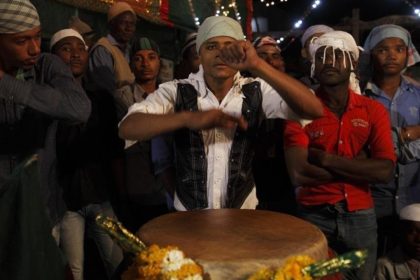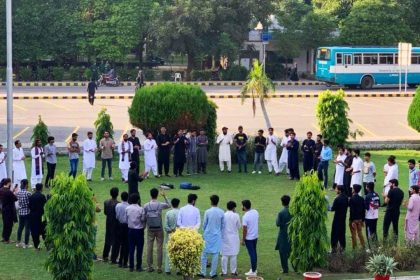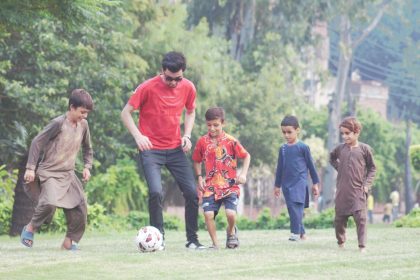Last month, I stayed at a local hotel in Islamabad for a workshop. During the usual check-in procedure at the reception, I waited on a sofa in the lobby. The lobby was crowded with people and children who appeared to be Pashtuns. I assumed they were staying at the 4-star hotel with a large family. I was surprised to find that they could hardly speak proper Urdu and didn’t seem to be from a troubled area. They mostly remained silent, but I noticed a strange fear in their eyes. Even now, recalling that fear sends shivers down my spine. Later, I learned they were neither Pakistanis nor a single family.
An Afghan woman later introduced herself and started a conversation that deeply disturbed me. Gulnar Bibi said, “We have been living here for more than two years. We don’t have visas, and we can’t even go outside; we spend the whole day in the hotel. We came from Afghanistan to save our lives, to come to an Islamic country, but when we arrived, we found out that we couldn’t stay here. They want to send us to Germany, where our children would attend non-Islamic schools. This is what we’ve heard from others who went to Germany before us; we stay in contact with them by phone. We also have young girls with us, who are very beautiful, and we fear for their future. I wish Pakistan would keep us here. In a Christian country, our children might forget their religion, and our girls might adapt to Western culture. Then what will we do? I cannot sleep, thinking about the future of my children. The government of Pakistan has ordered us to go back, but we’ve already escaped with our lives. If we return now, the Taliban will kill us.”
In a camp for Afghan refugees in the suburbs of Lahore, a young girl, Syed Bibi shared her concerns. She explained, “I was born here, and I don’t know what Afghanistan will be like. I don’t want to leave Pakistan. I studied here until the fifth grade, but I had to stop after the government’s announcement.”
A young married woman, Zarghoon said, “There are many bombings in Afghanistan, and there is a lot of poverty. Many people are dying of hunger. We have problems here, but we feel relatively safe. At least our children have some food and access to free education. Our men’s earnings are just enough for our daily living. It’s less than what we need, and it’s difficult to survive with this inflation. We have to stretch 10,000 rupees for the whole month. Sometimes, we have to eat bread with water. There’s no shame in it because we have no other choice, and sometimes we have to sleep on an empty stomach. We don’t even have money to return to our country. Those who went back to Afghanistan told us over the phone that they didn’t receive any financial help or compensation there. We were always beaten by the Taliban in our country, and here, the police have taken on that responsibility.”
Another woman, Gulmakae, added, “Here, we are living like slaves. Due to yesterday’s rain, water entered our tents, soaking all our belongings and ruining some of our daily necessities. My husband buys stale bread from people to sell in the market, but this only brings in minimal profit. He doesn’t have a Proof of Registration (PoR) card, so he can’t get a job anywhere. I have this card and have managed to obtain my husband’s certificate, but the police harass him a lot, causing us much trouble. I only studied up to the third grade in my homeland, but I wish my two daughters could get an education. My children couldn’t get admission to school because they require the parents’ Pakistani ID card. However, they are not even allowed into madrasahs. The madrasahs tell us that their admissions are closed—they deliberately do not admit our children. My children’s lives are deteriorating without education; they spend all day playing at home. One daughter is three years old, and the other is four. This is the age when they should be learning to read and write.”
Farashtay, a Pakistani-born woman, shared her concerns, explaining that due to a long and expensive process, and her father being a daily wager, her birth certificate or B-form could not be made, and now she didn’t have a Pakistani ID card. “I am married to an Afghan man, so now I have neither an Afghan card nor a Pakistani card. I have been trying for three years to get the certificate, but now it seems like an impossible task. We are not educated, but we have a teacher in our community who educates our children. However, the children cannot progress beyond primary or secondary education because we do not have Pakistani cards. Don’t our children have the right to learn and grow?”
An elder woman from the community, Khatun Bibi, complained about the lack of medical facilities, saying, “Doctor operated on her only after she fainted due to a heart attack; otherwise the doctor did not even prescribe her medicines with an Afghan card. If someone suddenly needs an operation, we have to borrow a local’s card (black market) at lower rates. We request the Pakistani government not to expel us from here. If we are given permission to work, we can contribute economically through our businesses. We have never sought to be treated as equals to Pakistanis.”
Kaynat Khan, a psychologist, volunteers some sessions with the community women. She shared her observations with this scribe, saying, “I noticed that these people lack self-awareness. Women refugees don’t have the power to make decisions, and are entirely dependent on the men. Even the men lack decision-making ability. Most of them rely on their community leader, whom they call ‘Haji Sahib’ or ‘Barra Bhai’ (elder brother). They are so dependent on Haji Sahib that if he forbids them from something, even if it is necessary, they will abandon the need. His decision is considered final.”
“As a psychologist, I also observed that they face endless problems because they are adhering to outdated rules in the 21st century. They do not understand the purpose of their lives or their existence. They are living according to the will of their families, like robots,” she added.
Kaynat continued, “Lack of education is one of the main reasons for their endless problems. Additionally, their economic conditions are very poor. Some women wanted to earn through stitching and embroidery, but they could not take such steps due to their dependence on family members. Many women asked me to request their community leader, ‘Haji Sahib’, to provide them with sewing machines so they could earn by working at home. However, I couldn’t promise them anything because I don’t know if Haji Sahib will listen to me. Although these women want to work, they cannot even appeal for help without Haji Sahib’s approval. The biggest issue is financial.”
Kaynat further said, “They also face many health problems. Since they marry at an early age, around 14, they develop numerous birth-related physical and mental health issues. Early marriage leads to anemia, maternity problems, panic attacks, and other health issues. Moreover, since they marry within their own community, these diseases tend to multiply across generations.”
“Their living conditions and standards also affect their mental health. Sharing a problem, a woman told me that her daughter got engaged, but now her in-laws were demanding dowry,” she said, adding that now that girl was also experiencing anxiety attacks because the family had neither means nor resources to arrange dowry.
Moniza Kakar, a human rights lawyer who handles cases involving Afghan refugees, told this scribe that because Pakistan lacked a formal refugee law, its policy was guided by the practical needs of the situation. She said Pakistan had not signed the 1951 Refugee Convention or its 1967 Protocols. “Although Pakistan has had an agreement with the United Nations High Commissioner for Refugees (UNHCR) since 1993, it is not legally binding.”
Moniza shared that while handling cases of Afghan refugees, she observed that they did not want to return. “Most of them arrived after the Taliban took power in 2021. They fear for their lives back home, as girls are forbidden from receiving education, and single mothers or girls are not allowed to work or leave the home without a man,” she explained. “If they cannot leave the house for work, their children may starve. For all these reasons, they do not want to return.”
She said the refugees were particularly worried about their children’s future, which without education would be as bleak as their own. “They view their stay in Pakistan as a temporary measure and wish to move to a safer country at a later stage.”
While sharing some data about Afghan refugees, she said, “The UNHCR can register Afghan refugees under a contract. At the moment, Pakistan has almost 1.3 million Proof of Registration card holders and 850,000 Afghan Citizen Card holders. The citizen card holders are looked after by the International Organization for Migration. According to authorities, the process of issuing cards or registering new arrivals was stopped years ago, which means their rights are not protected.”
Moniza said the Proof of Registration cards issued by UNHCR was an identity document for Afghan refugees that entitled them to legally remain in Pakistan. “Undocumented Afghans were issued citizen cards by the National Database and Registration Authority during 2017-18, and the document was valid until October 31, 2019.”
While discussing the history of the issue, she said, “Before this, since 1947, the ‘Afghan Tazkira,’ which is similar to an Afghan identity card, was issued by the government in Chaman. This practice continued until 2021, and the policy was that Afghans were not required to have a passport if they had an Afghan Tazkira. As a result, there was a significant protest from Afghans when the sudden passport policy was implemented for cross-border transportation or business.”
“Most of the refugees who came to Pakistan in the 1980s, and their children who were born here, have lived in Pakistan for 30 years to 35 years. According to the process of nationalization, one of their rights is to be granted citizenship. Similarly, our Citizenship Act does not prohibit granting citizenship to refugees, nor have we declared Afghanistan as our enemy. The citizenship law states that a child born in the territory has the right to citizenship, except for children of diplomats or those from an enemy country. However, in the case of Afghan refugees, our policy has exempted them from the rights granted under the Foreigners Act and Citizenship Act, despite having a birth certificate,” she continued.
The lawyer added, “Though the Foreigners Act, 1946, states that anyone who crosses the border without documents will be deported, there is no special provision for disabled, elderly, or single women. The government has the right to accept or reject them and can also impose fines.”
However, according to Customary International Human Rights Law, a country cannot forcibly send a refugee to an environment or country where their life is in danger. The International Covenant on Civil and Political Rights also prohibits this practice, as does the Convention Against Torture, among other treaties. Pakistan has signed all these treaties and human rights declarations, which means authorities cannot forcibly return any refugee.
Moniza said Pakistan must provide Afghan refugees with a proper opportunity to appeal before making a decision according to its rules. “Refugees must be given the right to prove that their lives are in danger. The current process of deporting those who arrived after 2021 without a hearing and without giving them a chance is a violation of international rights.”
Moniza continued, “Since we have no specific law, very few refugees have received any relief from the courts. According to the Foreigners Act, those who have a valid citizen card or Proof of Registration card can be acquitted or granted bail by the court in case of their arrest. However, those who arrived after the Taliban regime took power in 2021 have not been issued any cards by Pakistan. They have been given tokens by the UNHCR, but these tokens have no legal standing in court, she said.
While discussing the current situation, Moniza added, “Following the sudden policy shift, civil society in Pakistan has filed petitions on behalf of Afghan refugees in the Supreme Court of Pakistan and the Peshawar High Court, asking authorities not to expel them.”
She said the Peshawar High Court had directed the government of Pakistan not to deport singers and transgender individuals. Similar rights-based judgments have come from the High Court (IHC) and Sindh.
“These judgments have recognized basic human rights in the cases of refugees. For example, Rahil Azizi’s case in the IHC was successful. She was a police force employee in Afghanistan. Additionally, an Afghan family’s case in Sindh, also handled by myself, was successful. In these cases, the court considered humanitarian grounds.”
She further spoke about the refugee camps, saying, “The Afghan refugee camp in Karachi had a population of approximately 60,000 to 70,000 living in around 5,000 homes. However, there is no school, general physician, hospital, psychologist, or maternity center in the entire camp. The area is so remote that not even an ambulance is available for the sick. There is no proper sewage system, which makes life very difficult during the rainy season. Unfortunately, these people do not appeal to the courts. Those who are very old or came to Pakistan in their eighties have ration cards or PoR cards as evidence.”
Moniza concluded by saying, “In other countries, policies are made according to their own laws. Due to inconsistent policies, PoR card holders do not consider the lengthy, complex, and expensive process of child registration and documentation. As a result, their children cannot join high school because they lack the B-form required for 10th-grade exams.”
She said that Mohsin Dawar, a former lawmaker, had reportedly submitted the National Refugee Bill, 2023, in the National Assembly when he was still its member, but the draft law has disappeared from the scene.”
In conclusion, only by passing a law can we control the mushroom growth of the illegal visa mafia operating in the black market, and demonstrate to the international community our serious commitment to addressing the refugee issue. It will also help protect the community from local leaders who exploit and harass these innocent people for their own interests. A refugee law can foster friendly relations with neighboring Muslim countries and enable their citizens to make significant contributions to Pakistan’s economy. However, all this is possible only with the implementation of a refugee law.



